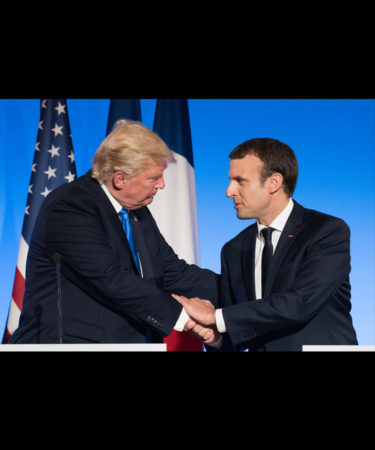An escalating trade dispute between France and the U.S. appears to be on hold, following positive talks between Presidents Donald Trump and Emmanuel Macron on Monday. The apparent truce could signal an end to proposed U.S. tariffs on French wines, cheese, and other imported goods.
What happened?
On Monday, President Macron announced on Twitter that the two countries were working on a “good agreement to avoid tariff escalation.” A few hours later, President Trump retweeted Macron’s message, commenting, “Excellent!”
The now-tabled tariffs are distinct from the 25 percent wine tariffs imposed last October, which were limited to a handful of European countries, France among them. Those tariffs have received renewed attention in recent weeks due to the looming threat of an escalation to a rate of 100 percent (more on that below).
What didn’t happen?
While the tweets signaled improving relations between the two countries, U.S. officials stopped short of confirming the potential tariffs have been called off for good.
In a statement on Monday, White House spokesman Judd Deere said only that the “two leaders agreed it is important to complete successful negotiations on the digital services tax” and also “discussed other bilateral issues.”
What is the digital services tax and how does it relate to wine tariffs?
Signed on July 24, 2019, the tax enables France to collect revenue from American tech companies, including Amazon, Facebook, and Google, in relation to business activities that take place within its borders.
On Dec. 3, 2019, the Trump administration announced it was considering retaliatory 100 percent tariffs on French goods, including sparkling wine and cheese. The announcement came after the Office of the U.S. Trade Representative (USTR) concluded the digital service tax discriminated against U.S. tech companies while sparing French firms.
Earlier this month, the USTR chaired a hearing in Washington D.C. to discuss whether the tariffs should be imposed. During the hearing, two dozen wine wholesalers and retailers made clear their strong opposition to the potential duties, arguing they would seriously harm their businesses.
A coalition of 10 wine groups also sent a letter to the USTR denouncing the tariffs. The group predicted that the tariffs would increase the cost of French sparkling wine to importers by $718 million and could lead to thousands of job losses within the U.S. wine industry.
What happens next?
While the tariffs appear to have been shelved for now, their ultimate fate depends on whether the U.S. and France can come to an agreement on the digital services tax.
According to Bloomberg, both countries have discussed the possibility of France suspending collection of the digital tax payments, which are due in April. This relies on the U.S. holding back on imposing its proposed tariffs, however, and only represents a temporary solution. “It remains a difficult negotiation — with digital tax, the devil is in the details and we need to resolve the details,” French Finance Minister Bruno Le Maire said.
Crucially, France does not view its digital services tax as discriminatory, so this only impedes the ongoing negotiations. Further complicating the matter is the fact that other European nations are considering a similar digital tax.
If and when France and the U.S. do come to an agreement, there still remains the issue of the separate 25 percent tariff on European wines. This tariff, which relates to a dispute between Airbus and Boeing, could potentially rise to as much as 100 percent in the coming weeks.
For more information on both trade disputes, and the potential damage they might cause on the U.S. wine industry, see VinePair’s in-depth coverage here.
